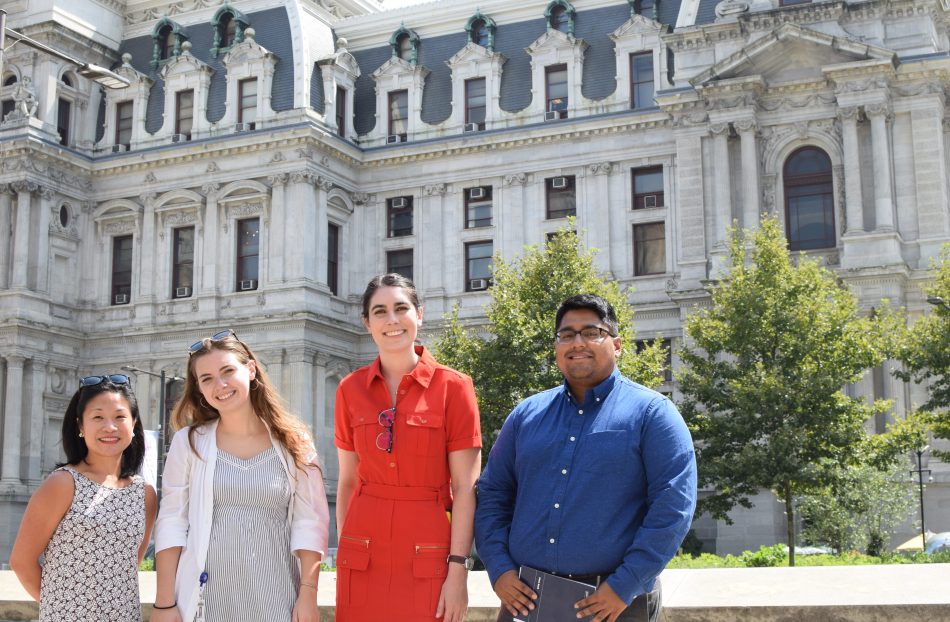
Symbol Lai (above, far left) is the deputy director in the city’s Office of Immigrant Affairs (OIA), which was formerly known under Mayor Michael Nutter as the Mayor’s Office of Immigrant and Multicultural Affairs. OIA — which adopted its name when Mayor Jim Kenney was elected in 2016 — is designed to provide immigrants support and a voice on a citywide level.
What needs in this city is OIA responding to?
It’s a broad set of needs because it’s municipal government. But in general, the mission of the office was to make sure the immigrants and immigrant communities have a connection to municipal government. They need a little bit more attention and strategies to make sure that municipal government can respond to their needs, and they feel like they have a line of communication. Since the Office of Immigrant Affairs took form in government, a lot of things have changed. The 2016 election happened, so it’s responding to a new sense of urgency.
Because we are the voice of the city, we have a bigger platform than individual nonprofits and we can help set a new standard.
Are there any specific initiatives that have been born out of that sense of urgency?
Right after the election happened, a group of lawyers teamed up with community legal organizations and the American Bar Association, and they convened a meeting under the name Take Action Philly. It’s now called the New Americans Campaign (NAC) and they’ve continued to hold citywide citizenship screenings. Our office is part of the conversation to keep this program going, to work with the partners to coordinate, to essentially coordinate an effort, but NAC is headed by HIAS Pennsylvania. So that’s one example of a concrete program that our office is involved in that came in response to the 2016 election.
The second program that we’ve done is called the Immigrant Worker Academy, and it is a community outreach program around immigrant workers’ rights. We partner closely with a neighborhood organization that gives us guidance around some of the languages are spoken, what the particular needs are of that neighborhood. We provide a lot of the labor and convene the facilitators and to make sure that the event that happened, that folks are kind of leading immigrants and the constituents where they’re at.
This came out because folks said that, as it is, immigrant workers are some of the most vulnerable people in the workforce, considering language and racism and cultural barriers. After the election, a lot of the service providers started realizing that people were even more scared in workplaces.
What is OIA’s role in immigration policy for the city?
A lot of what our office does is make that line between federal policy and municipal policy clear. There’s a lot of changes coming down from the federal pipeline, but it’s not always clear about how it plays out on a local level and what are the legal implications of that for families in Philadelphia. One of the responsibilities of the office is to make sure that the information that folks are receiving is not going to generate more paranoia and that the implications of where the city stands on these things is very, very clear for people.
It’s also to make sure that this is communicated to our nonprofit partners so that they know exactly what parameters they have to operate in and that offers them when they know what kind of space and what kind of leeway that they have. It allows people to create more support to make sure that immigrants feel very welcome in the city.
Does OIA typically support the view of immigration taken by the city, which are usually spearheaded by Mayor Kenney?
Yeah, we’re a city office. I guess the way to think about it is we’re the city’s position on immigration. Our office works closely with Mayor Kenney to develop the different stances and different policies to respond some of the federal problems.
What are immigrants’ most paramount needs?
Where to begin? There’s a lot. I think safety is one, especially now where the xenophobic rhetoric is so blatant and complicit. Others are whether or not they have access to a job, whether or not they are entitled to a home, whether or not they’re entitled to public education or language access in different arenas. If you wanted to sum it up, whether they have the ability to go about their daily lives without actually having to question access to certain things.
What do you think OIA’s impact is on the typical immigrant in Philadelphia?
It’s hard to say. I do think that it’s helpful to have an office where somebody and any of our community partners feel like they have a direct line to call. If something happened, they can call on our staff and then we can kind of troubleshoot it. Bureaucracy can be something that’s very unwieldy and very imposing. The office makes it feel more manageable.
-Text and image by Grace Shallow.


Be the first to comment